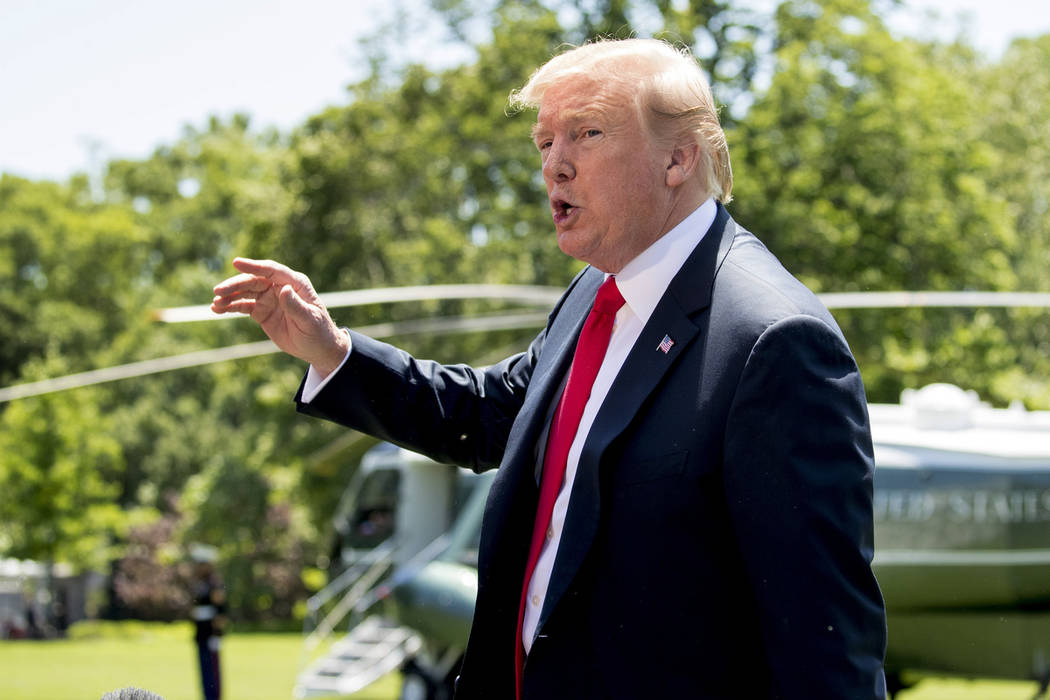Trump confirms possibility of pardons for some war criminals

WASHINGTON — President Donald Trump confirmed Friday that he is considering pardons for two or three servicemen accused of or convicted of war crimes, a possibility that has set off a wave of criticism.
“We’re looking at a lot of different pardons for a lot of different people,” Trump said as he was departing for a state visit to Japan. “Some of these soldiers are people that have fought hard, long. You know, we teach them how to be great fighters, and then when they fight, sometimes they get, really, treated very unfairly.
“So we’re going to take a look at it. I haven’t done anything yet. I haven’t made any decisions. There’s two or three of them right now. It’s a little bit controversial. It’s very possible that I’ll let the trials go on and I’ll make my decision after the trial.”
The New York Times reported earlier that administration officials had asked for expedited requests about several individuals who have been convicted of or charged with war crimes.
The White House list reportedly included Edward Gallagher, a Navy SEAL charged with murder and shooting unarmed civilians; Matthew L. Golsteyn, who was charged with killing an unarmed Afghan in 2010; and former Blackwater contractor Nicholas A. Slatten, who was convicted of killing 17 Iraqis.
The Times report said Trump could issue the pardons around Memorial Day.
Since the report was published, some veterans have spoken out against the idea.
“When Trump champions war criminals as brave patriots who are simply victims of political correctness, he seems to push for a climate that condones unethical and criminal behavior. He appears to write off war crimes as the cost of doing business,” Iraq War veteran Waitman Wade Beorn wrote in The Washington Post.
Gen. Martin Dempsey, a retired chairman of the Joint Chiefs of Staff, also warned against the pardons in a tweet: “Absent evidence of innocence or injustice, the wholesale pardon of U.S. service members accused of war crimes signals our troops and allies that we don’t take the Law of Armed Conflict seriously. Bad message. Bad precedent. Abdication of moral responsibility. Risk to us. #Leadership.”
Pete Buttigieg — the South Bend, Indiana, mayor running in the 2020 Democratic presidential primary who served a six-month stint in Afghanistan as a Navy reservist — also voiced outrage at the prospect.
“American military law is abundantly clear on what you do and do not do in uniform,” he said at a Washington Post forum. “And if you do something wrong in uniform, you will be prosecuted and you will be held accountable. If the president blows a hole in that, he is blowing a hole in the integrity of the military and he is putting troops’ lives at risk.”
Margaret Love, who served as the Department of Justice pardon attorney when William Barr was attorney general under President George H.W. Bush, told the Review-Journal that the administration inquiries will force the DOJ to take a stand on whether Trump should grant clemency in each of the cases. Trump has relied on his gut instincts when deciding whether to issue pardons or commutations up until now.
Love also wrote in the legal blog “Lawfare” that she is optimistic Barr will advise Trump “to forbear in these war crimes cases at least until the military justice system has run its course.”
Earlier this month, Trump ended a 10-month pause on his use of the pardon power when he granted a full pardon to former Army 1st Lt. Michael Behenna, who had been convicted of unpremeditated murder of a suspected al-Qaida terrorist in Iraq in 2008. Behenna had been paroled from prison in 2014 after he served five years of a 25-year sentence that later was reduced to 15 years.
Former Trump surrogate Jeffrey Lord told the Review-Journal he believes Trump will grant clemency if he sees a miscarriage of justice, just as the president did when he commuted the sentence for Alice Marie Johnson, a nonviolent drug offender sentenced to life without parole, after reality TV star Kim Kardashian lobbied for her release.
Absent evidence of innocence or injustice the wholesale pardon of US servicemembers accused of war crimes signals our troops and allies that we don’t take the Law of Armed Conflict seriously. Bad message. Bad precedent. Abdication of moral responsibility. Risk to us. #Leadership
— GEN(R) Marty Dempsey (@Martin_Dempsey) May 21, 2019
Contact Debra J. Saunders at dsaunders@reviewjournal.com or 202-662-7391. Follow @DebraJSaunders on Twitter.